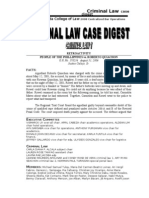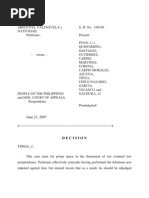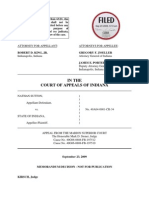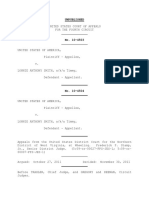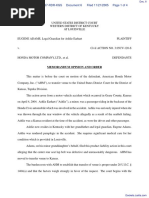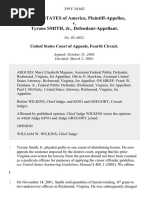Correccional As Minimum To Seven (7) Years of Prision Mayor As
Correccional As Minimum To Seven (7) Years of Prision Mayor As
Uploaded by
BrunxAlabastroCopyright:
Available Formats
Correccional As Minimum To Seven (7) Years of Prision Mayor As
Correccional As Minimum To Seven (7) Years of Prision Mayor As
Uploaded by
BrunxAlabastroOriginal Title
Copyright
Available Formats
Share this document
Did you find this document useful?
Is this content inappropriate?
Copyright:
Available Formats
Correccional As Minimum To Seven (7) Years of Prision Mayor As
Correccional As Minimum To Seven (7) Years of Prision Mayor As
Uploaded by
BrunxAlabastroCopyright:
Available Formats
Valenzuela vs. People Facts: The basic facts are no longer disputed before us.
The case stems from an Information charging petitioner Aristotel Valenzuela (petitioner) and Jovy Calderon (Calderon) with the crime of theft. On 19 May 1994, at around 4:30 p.m., petitioner and Calderon were sighted outside the Super Sale Club, a supermarket within the ShoeMart (SM) complex along North EDSA, by Lorenzo Lago (Lago), a security guard who was then manning his post at the open parking area of the supermarket. Lago saw petitioner, who was wearing an identification card with the mark Receiving Dispatching Unit (RDU), hauling a push cart with cases of detergent of the well-known Tide brand. Petitioner unloaded these cases in an open parking space, where Calderon was waiting. Petitioner then returned inside the supermarket, and after five (5) minutes, emerged with more cartons of Tide Ultramatic and again unloaded these boxes to the same area in the open parking space. Thereafter, petitioner left the parking area and haled a taxi. He boarded the cab and directed it towards the parking space where Calderon was waiting. Calderon loaded the cartons of Tide Ultramatic inside the taxi, then boarded the vehicle. All these acts were eyed by Lago, who proceeded to stop the taxi as it was leaving the open parking area. When Lago asked petitioner for a receipt of the merchandise, petitioner and Calderon reacted by fleeing on foot, but Lago fired a warning shot to alert his fellow security guards of the incident. Petitioner and Calderon were apprehended at the scene, and the stolen merchandise recovered. The filched items seized from the duo were four (4) cases of Tide Ultramatic, one (1) case of Ultra 25 grams, and three (3) additional cases of detergent, the goods with an aggregate value of P12,090.00. Petitioner and Calderon were first brought to the SM security office before they were transferred on the same day to the Baler Station II of the Philippine National Police, Quezon City, for investigation. It appears from the police investigation records that apart from petitioner and Calderon, four (4) other persons were apprehended by the security guards at the scene and delivered to police custody at the Baler PNP Station in connection with the incident. However, after the matter was referred to the Office of the Quezon City Prosecutor, only petitioner and Calderon were charged with theft by the Assistant City Prosecutor, in Informations prepared on 20 May 1994, the day after the incident. After pleading not guilty on arraignment, at the trial, petitioner and Calderon both claimed having been innocent bystanders within the vicinity of the Super Sale Club on the afternoon of 19 May 1994 when they were haled by Lago and his fellow security guards after a commotion and brought to the Baler PNP Station. Calderon alleged that on the afternoon of the incident, he was at the Super Sale Club to withdraw from his ATM account, accompanied by his neighbor, Leoncio Rosulada. As the queue for the ATM was long, Calderon and Rosulada decided to buy snacks inside the supermarket. It was while they were eating that they heard the gunshot fired by Lago, leading them to head out of the building to check what was transpiring. As they were outside, they were suddenly grabbed by a security guard, thus commencing their detention. Meanwhile, petitioner testified during trial that he and his cousin, a Gregorio Valenzuela, had been at the parking lot, walking beside the nearby BLISS complex and headed to ride a tricycle going to Pag-asa, when they saw the security guard Lago fire a shot. The gunshot caused him and the other people at the scene to start running, at which point he was apprehended by Lago and brought to the security office. Petitioner claimed he was detained at the security office until around 9:00 p.m., at which time he and the others were brought to the Baler Police Station. At the station, petitioner denied having stolen the cartons of detergent, but he was detained overnight, and eventually brought to the prosecutors office where he was charged with theft. During petitioners cross-examination, he admitted that he had been
employed as a bundler of GMS Marketing, assigned at the supermarket though not at SM. In a Decision promulgated on 1 February 2000, the Regional Trial Court (RTC) of Quezon City, Branch 90, convicted both petitioner and Calderon of the crime of consummated theft. They were sentenced to an indeterminate prison term of two (2) years of prision correccional as minimum to seven (7) years of prision mayor as maximum. The RTC found credible the testimonies of the prosecution witnesses and established the convictions on the positive identification of the accused as perpetrators of the crime. Both accused filed their respective Notices of Appeal, but only petitioner filed a brief with the Court of Appeals, causing the appellate court to deem Calderons appeal as abandoned and consequently dismissed. Before the Court of Appeals, petitioner argued that he should only be convicted of frustrated theft since at the time he was apprehended, he was never placed in a position to freely dispose of the articles stolen. However, in its Decision dated 19 June 2003, the Court of Appeals rejected this contention and affirmed petitioners conviction. Hence the present Petition for Review, which expressly seeks that petitioners conviction be modified to only of Frustrated Theft. Even in his appeal before the Court of Appeals, petitioner effectively conceded both his felonious intent and his actual participation in the theft of several cases of detergent with a total value of P12,090.00 of which he was charged. As such, there is no cause for the Court to consider a factual scenario other than that presented by the prosecution, as affirmed by the RTC and the Court of Appeals. The only question to consider is whether under the given facts, the theft should be deemed as consummated or merely frustrated. Held: Article 6 defines those three stages, namely the consummated, frustrated and attempted felonies. A felony is consummated when all the elements necessary for its execution and accomplishment are present. It is frustrated when the offender performs all the acts of execution which would produce the felony as a consequence but which, nevertheless, do not produce it by reason of causes independent of the will of the perpetrator. Finally, it is attempted when the offender commences the commission of a felony directly by overt acts, and does not perform all the acts of execution which should produce the felony by reason of some cause or accident other than his own spontaneous desistance. Each felony under the Revised Penal Code has a subjective phase, or that portion of the acts constituting the crime included between the act which begins the commission of the crime and the last act performed by the offender which, with prior acts, should result in the consummated crime. After that point has been breached, the subjective phase ends and the objective phase begins. It has been held that if the offender never passes the subjective phase of the offense, the crime is merely attempted. On the other hand, the subjective phase is completely passed in case of frustrated crimes, for in such instances, *s+ubjectively the crime is complete. Truly, an easy distinction lies between consummated and frustrated felonies on one hand, and attempted felonies on the other. So long as the offender fails to complete all the acts of execution despite commencing the commission of a felony, the crime is undoubtedly in the attempted stage. Since the specific acts of execution that define each crime under the Revised Penal Code are generally enumerated in the code itself, the task of ascertaining whether a crime is attempted only would need to compare the acts actually performed by the accused as against the acts that constitute the felony under the Revised Penal Code. In contrast, the determination of whether a crime is frustrated or consummated necessitates an initial concession that all of the acts of execution have been performed by the offender. The critical distinction instead is whether the felony itself was actually produced by the acts of execution. The determination of whether the
felony was produced after all the acts of execution had been performed hinges on the particular statutory definition of the felony. It is the statutory definition that generally furnishes the elements of each crime under the Revised Penal Code, while the elements in turn unravel the particular requisite acts of execution and accompanying criminal intent. The long-standing Latin maxim actus non facit reum, nisi mens sit rea supplies an important characteristic of a crime, that ordinarily, evil intent must unite with an unlawful act for there to be a crime, and accordingly, there can be no crime when the criminal mind is wanting. Accepted in this jurisdiction as material in crimes mala in se, mens rea has been defined before as a guilty mind, a guilty or wrongful purpose or criminal intent, and essential for criminal liability. It follows that the statutory definition of our mala in se crimes must be able to supply what the mens rea of the crime is, and indeed the U.S. Supreme Court has comfortably held that a criminal law that contains no mens rea requirement infringes on constitutionally protected rights. The criminal statute must also provide for the overt acts that constitute the crime. For a crime to exist in our legal law, it is not enough that mens rea be shown; there must also be an actus reus.
You might also like
- Valenzuela v. PeopleDocument5 pagesValenzuela v. PeopleNoreenesse SantosNo ratings yet
- Ra 4566Document2 pagesRa 4566BrunxAlabastroNo ratings yet
- One Person CorporationDocument15 pagesOne Person CorporationCIM Imperial MacatangayNo ratings yet
- HB 1274 - Death PenaltyDocument3 pagesHB 1274 - Death PenaltyNick100% (1)
- Elizabeth Espinoza 2013 ArrestDocument2 pagesElizabeth Espinoza 2013 ArrestErin LaviolaNo ratings yet
- Aristotel Valenzuela y Natividad Vs PeopleDocument2 pagesAristotel Valenzuela y Natividad Vs PeopleZepht BadillaNo ratings yet
- Topic: Crimes Against Property Theft SummaryDocument3 pagesTopic: Crimes Against Property Theft SummarykathrynmaydevezaNo ratings yet
- Valenzuela Vs PeopleDocument2 pagesValenzuela Vs PeopleAysNo ratings yet
- Crim Law Case Digests 2008 (Mat)Document72 pagesCrim Law Case Digests 2008 (Mat)Erlinda Hollanda Silva100% (2)
- Crim Law Case Digests 2008 MatDocument72 pagesCrim Law Case Digests 2008 MatJose Rizal100% (1)
- People of The Philippines V ComadreDocument1 pagePeople of The Philippines V ComadresashinaNo ratings yet
- Valenzuela Vs PeopleDocument22 pagesValenzuela Vs PeopleshakiraNo ratings yet
- G. R. No. 160188 June 21, 2007 Aristotel Valenzuela y NATIVIDAD, Petitioner, People of The Philippines and Hon. Court of Appeals NACHURA, RespondentsDocument18 pagesG. R. No. 160188 June 21, 2007 Aristotel Valenzuela y NATIVIDAD, Petitioner, People of The Philippines and Hon. Court of Appeals NACHURA, RespondentsMinorka Sushmita Pataunia SantoluisNo ratings yet
- CASE No. 23 Aristotel Valenzuela y Natividad vs. The People of The Philippines and Hon. Court of AppealsDocument2 pagesCASE No. 23 Aristotel Valenzuela y Natividad vs. The People of The Philippines and Hon. Court of AppealsJonel L. SembranaNo ratings yet
- Valenzuela Vs PeopleDocument2 pagesValenzuela Vs PeoplePrincessAngelaDeLeon100% (5)
- RPM CasesDocument43 pagesRPM CasesRobert Paul A MorenoNo ratings yet
- ValenzuelaDocument6 pagesValenzuelaAbi GieNo ratings yet
- G.R. No. 160188Document11 pagesG.R. No. 160188리안No ratings yet
- Actus Non Facit Reum, Nisi Mens Sit ReaDocument1 pageActus Non Facit Reum, Nisi Mens Sit ReaRojan PaduaNo ratings yet
- Valenzuela Vs People - Case DigestDocument2 pagesValenzuela Vs People - Case DigestPatricia OcampoNo ratings yet
- 05 Valenzuela Vs PeopleDocument21 pages05 Valenzuela Vs PeopleFina SchuckNo ratings yet
- Criminal Law Cases IIDocument17 pagesCriminal Law Cases IIDael GerongNo ratings yet
- Valenzuela v. PeopleDocument23 pagesValenzuela v. PeopleKaren Joy MasapolNo ratings yet
- Valenzuela V PeopleDocument2 pagesValenzuela V PeopleDanielleNo ratings yet
- No Frustrated TheftDocument40 pagesNo Frustrated TheftprosfrvNo ratings yet
- 116928-2007-Valenzuela y Natividad v. PeopleDocument21 pages116928-2007-Valenzuela y Natividad v. PeopleLeona SanchezNo ratings yet
- 109 People Vs CogaedDocument4 pages109 People Vs CogaedRae Angela GarciaNo ratings yet
- Valenzuela vs. PeopleDocument2 pagesValenzuela vs. PeopleAKnownKneeMouseeNo ratings yet
- CrimLaw1 Cases 149-152Document7 pagesCrimLaw1 Cases 149-152Dennis Jay Dencio ParasNo ratings yet
- Valenzuela V PeopleDocument3 pagesValenzuela V PeopleRicky James Laggui SuyuNo ratings yet
- Valenzuela vs. People 525 SCRA 306 June 21, 2007Document16 pagesValenzuela vs. People 525 SCRA 306 June 21, 2007Emmylou Shayne LayogNo ratings yet
- 1 Theft - SquattingDocument49 pages1 Theft - SquattingMarry SuanNo ratings yet
- NO FrustatedTheftDocument19 pagesNO FrustatedTheftrjapsNo ratings yet
- Cases 2Document268 pagesCases 2Alex RabanesNo ratings yet
- Ppol Vs Sy ChuaDocument14 pagesPpol Vs Sy Chuamichelle_calzada_1No ratings yet
- Castaño Criminal-Procedure Case-DigestsDocument26 pagesCastaño Criminal-Procedure Case-DigestsStephen Neil Casta�oNo ratings yet
- People v. CompradoDocument3 pagesPeople v. CompradoElla B.67% (3)
- Dela Cruz vs. People G.R. No. 200748, July 23, 2014 Facts: Petitioner Jaime D. Dela Cruz Was Charged With Violation of Section 15, Article II ofDocument20 pagesDela Cruz vs. People G.R. No. 200748, July 23, 2014 Facts: Petitioner Jaime D. Dela Cruz Was Charged With Violation of Section 15, Article II ofredlacsonNo ratings yet
- Valenzuela v. PeopleDocument1 pageValenzuela v. PeoplemagbojosjhoannaNo ratings yet
- G. R. No. 160188 Valenzuela v. People, 525 SCRA 306Document16 pagesG. R. No. 160188 Valenzuela v. People, 525 SCRA 306Shereen AlobinayNo ratings yet
- 3 G. R. No. 160188 ValenzuelaDocument17 pages3 G. R. No. 160188 Valenzuelablancobella543No ratings yet
- Consti 2 CasesDocument80 pagesConsti 2 CasesZonix LomboyNo ratings yet
- People Vs Sy ChuaDocument3 pagesPeople Vs Sy ChuaMyra MyraNo ratings yet
- CD - People Vs Edano - July 17, 2014Document3 pagesCD - People Vs Edano - July 17, 2014Roxan FranciscoNo ratings yet
- Module 3 CLJ 3Document8 pagesModule 3 CLJ 3Maynard Olim PedongNo ratings yet
- Sulpicio Intod vs. Honorable Court of Appeals and People of The PhilippinesDocument6 pagesSulpicio Intod vs. Honorable Court of Appeals and People of The PhilippinesJoefritzVaronNo ratings yet
- Aristotle Valenzuela VsDocument4 pagesAristotle Valenzuela VsRica Marion DayagNo ratings yet
- 06 Valenzuela y Natividad v. People GR No. 160188 Jun 21 2007Document41 pages06 Valenzuela y Natividad v. People GR No. 160188 Jun 21 2007Greta Fe DumallayNo ratings yet
- PPL v. IsmaelDocument3 pagesPPL v. IsmaelTootsie GuzmaNo ratings yet
- G.R. No. 201363. March 18, 2013. PEOPLE OF THE PHILIPPINES, Plaintiff-Appellee, vs. NAZARENO VILLAREAL y LUALHATI, Accused-AppellantDocument8 pagesG.R. No. 201363. March 18, 2013. PEOPLE OF THE PHILIPPINES, Plaintiff-Appellee, vs. NAZARENO VILLAREAL y LUALHATI, Accused-AppellantDonna BeeNo ratings yet
- #02 G. R. No. 160188Document13 pages#02 G. R. No. 160188Fe Myra LagrosasNo ratings yet
- Astorga vs. PeoplefactsDocument9 pagesAstorga vs. PeoplefactsKuthe Ig TootsNo ratings yet
- 005 People Vs Calantiao 727 Scra 20Document11 pages005 People Vs Calantiao 727 Scra 20Maria Jeminah TurarayNo ratings yet
- DigestDocument3 pagesDigestJohn Lester LantinNo ratings yet
- Cralawcralaw Cralaw Cralaw Cralaw: Republic of The Philippines ManilaDocument14 pagesCralawcralaw Cralaw Cralaw Cralaw: Republic of The Philippines ManilaShyla Joy RamosNo ratings yet
- 5.1 Valenzuela Vs People GR No. 160188 June 21, 2007Document12 pages5.1 Valenzuela Vs People GR No. 160188 June 21, 2007carlota ann lafuenteNo ratings yet
- Valenzuela V People (Theft, No Frustrated Stage)Document1 pageValenzuela V People (Theft, No Frustrated Stage)Chilzia RojasNo ratings yet
- 99 PP Vs MalimitDocument1 page99 PP Vs Malimitian ballartaNo ratings yet
- G.R. Nos. 136066-67 February 4, 2003 PEOPLE OF THE PHILIPPINES, Plaintiff-Appellee, BINAD SY CHUA, Accused-AppellantDocument90 pagesG.R. Nos. 136066-67 February 4, 2003 PEOPLE OF THE PHILIPPINES, Plaintiff-Appellee, BINAD SY CHUA, Accused-AppellantHartel BuyuccanNo ratings yet
- Valenzuela v People Gr No 160188Document18 pagesValenzuela v People Gr No 160188Gino RicafortNo ratings yet
- Crim 4-ssDocument266 pagesCrim 4-ssThea Thei YaNo ratings yet
- Summary: Constitutional Chaos: Review and Analysis of Andrew P. Napolitano's BookFrom EverandSummary: Constitutional Chaos: Review and Analysis of Andrew P. Napolitano's BookNo ratings yet
- DOLE Sheriffs Manual On Execution of Judgments PDFDocument17 pagesDOLE Sheriffs Manual On Execution of Judgments PDFBrunxAlabastroNo ratings yet
- Hilario Camino MoncadoDocument1 pageHilario Camino MoncadoBrunxAlabastroNo ratings yet
- Hts Policy PhilippinesDocument15 pagesHts Policy PhilippinesBrunxAlabastro100% (1)
- Affidavit Funeral Expense Ret01224 PDFDocument1 pageAffidavit Funeral Expense Ret01224 PDFBrunxAlabastroNo ratings yet
- Foundations of Public and Private LawDocument18 pagesFoundations of Public and Private LawBrunxAlabastroNo ratings yet
- UcDocument9 pagesUcBrunxAlabastroNo ratings yet
- BQDocument3 pagesBQBrunxAlabastroNo ratings yet
- WIPO TnalakDocument420 pagesWIPO TnalakBrunxAlabastroNo ratings yet
- Pro E: Joint Ipophl-Ncip Administrative Order No. 01Document7 pagesPro E: Joint Ipophl-Ncip Administrative Order No. 01BrunxAlabastroNo ratings yet
- 5 Reminders Concerning Traditional Knowledge Protection in The PhilippinesDocument5 pages5 Reminders Concerning Traditional Knowledge Protection in The PhilippinesBrunxAlabastroNo ratings yet
- Administrative Order No. 2016-0003Document13 pagesAdministrative Order No. 2016-0003Anonymous ku7POqvKNo ratings yet
- WIPO Tnalak PDFDocument21 pagesWIPO Tnalak PDFBrunxAlabastroNo ratings yet
- 10 - Leny Villareal - 2 Legal Framework For GI Protection in TheDocument28 pages10 - Leny Villareal - 2 Legal Framework For GI Protection in TheBrunxAlabastroNo ratings yet
- Clu3m - Elements of A CrimeDocument2 pagesClu3m - Elements of A Crimeapi-334810559No ratings yet
- United States v. Miguel Morales-Quinones, 812 F.2d 604, 10th Cir. (1987)Document16 pagesUnited States v. Miguel Morales-Quinones, 812 F.2d 604, 10th Cir. (1987)Scribd Government DocsNo ratings yet
- United States v. Felix Almonte, 4th Cir. (2014)Document4 pagesUnited States v. Felix Almonte, 4th Cir. (2014)Scribd Government DocsNo ratings yet
- Special Penal LawsDocument15 pagesSpecial Penal LawsAlvin Klyde CaspilloNo ratings yet
- Tan Vs Standard Vacuum Oil Co.Document2 pagesTan Vs Standard Vacuum Oil Co.TriciaNo ratings yet
- U.S. Marshals Arrest 15 Most Wanted New York City Murder Suspect in BridgeportDocument2 pagesU.S. Marshals Arrest 15 Most Wanted New York City Murder Suspect in BridgeportErin LaviolaNo ratings yet
- Modes of Extinguishment of Agency Part 2Document3 pagesModes of Extinguishment of Agency Part 2Mark Anthony Javellana SicadNo ratings yet
- 09230908jsk Sutton V StateDocument8 pages09230908jsk Sutton V StatewarriorsevenNo ratings yet
- BigamyDocument2 pagesBigamyNg Yih MiinNo ratings yet
- United States v. Lonnie Smith, 4th Cir. (2011)Document15 pagesUnited States v. Lonnie Smith, 4th Cir. (2011)Scribd Government DocsNo ratings yet
- Moot ProblemDocument3 pagesMoot ProblemRao Hitesh Yadav100% (2)
- Missing or Dead Persons: International Humanitarian Law & Refugee LawDocument38 pagesMissing or Dead Persons: International Humanitarian Law & Refugee LawarunabhsharmaNo ratings yet
- Earhart v. Honda Motor Co LTD Et Al - Document No. 6Document4 pagesEarhart v. Honda Motor Co LTD Et Al - Document No. 6Justia.comNo ratings yet
- Treason Cases Digested (Crim Law 2)Document5 pagesTreason Cases Digested (Crim Law 2)Jacob Castro100% (2)
- Act 24 Arrest or Conviction Report Oct 2019Document3 pagesAct 24 Arrest or Conviction Report Oct 2019api-331208251No ratings yet
- Francisco Jarque vs. Smith, Bell & Co., LTD.Document2 pagesFrancisco Jarque vs. Smith, Bell & Co., LTD.Anny YanongNo ratings yet
- United States v. Tyrone Smith, JR., 359 F.3d 662, 4th Cir. (2004)Document6 pagesUnited States v. Tyrone Smith, JR., 359 F.3d 662, 4th Cir. (2004)Scribd Government DocsNo ratings yet
- Motion To Exclude Taurus Audio Recordings (Skidmore v. Led Zeppelin "Stairway To Heaven" Lawsuit)Document9 pagesMotion To Exclude Taurus Audio Recordings (Skidmore v. Led Zeppelin "Stairway To Heaven" Lawsuit)James CookNo ratings yet
- An Eye For Eye Will Make The Whole World Blind: - Mahatma GandhiDocument12 pagesAn Eye For Eye Will Make The Whole World Blind: - Mahatma Gandhidynamo vjNo ratings yet
- Explosives Regulations Act of GhanaDocument8 pagesExplosives Regulations Act of GhanaCrispin Cris NspmNo ratings yet
- Anthony Bagtas - Philadelphia Court DocketDocument3 pagesAnthony Bagtas - Philadelphia Court DocketPenn Buff NetworkNo ratings yet
- Legal Writing - Annex B-1 - Affidavit (Ace)Document2 pagesLegal Writing - Annex B-1 - Affidavit (Ace)Syzian ExonyryNo ratings yet
- The Negotiable Instruments Act Was Passed in The Year 1881Document5 pagesThe Negotiable Instruments Act Was Passed in The Year 1881nehaNo ratings yet
- Recent Photo: UF. 43 (Revised) Police DepartmentDocument30 pagesRecent Photo: UF. 43 (Revised) Police DepartmentShah GeeNo ratings yet
- Full Case LegmedDocument39 pagesFull Case LegmedCarlo BarangtayNo ratings yet
- Marcellana and Gumanoy V The Philippines, Case No. 1560-2007Document12 pagesMarcellana and Gumanoy V The Philippines, Case No. 1560-2007Leica JaymeNo ratings yet
- HRC Beletsky 1-9-2019Document18 pagesHRC Beletsky 1-9-2019mbebinger280No ratings yet
- Criminal Law Case DigestDocument49 pagesCriminal Law Case DigestTecson Maryjoie100% (3)








